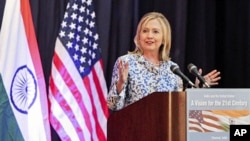Secretary of State Hillary Clinton urged India Wednesday to match its economic progress by taking a more assertive political role in Central and East Asia. In a policy speech in Chennai capping a three-day India visit, Clinton said the United States “is betting on India’s future.”
Clinton reiterated President Barack Obama’s endorsement last November of a permanent U.N. Security Council seat for India. She also made a strong public appeal to India to expand its influence, saying that India has the potential to positively shape the future of the Asia-Pacific region.
Common interests
The secretary of state chose Chennai, a bustling port and manufacturing center on India’s southeast coast, as representative of the country’s so-called “Look East” policy of growing trade and political ties with East Asia.
Clinton said as two of the world’s leading democracies, the United States and India have common interests and values in Asia, including protecting sea lanes and promoting democracy and human rights - areas where the United States has at times clashed with China.
"The more our countries trade and invest with each other and with other partners, the more central the Asia-Pacific region becomes to global commerce and prosperity, and the more interest we both have in maintaining stability and security. As the stakes grow higher, we should use our shared commitments to make sure that we have maritime security and freedom of navigation,” Clinton said.
The secretary of state will travel Thursday to Indonesia for political talks hosted by the ASEAN countries, several of which have competing territorial claims with China over the waters of the South China Sea.
Central Asia
Clinton urged India to use its economic power to boost commerce across Central Asia, including Afghanistan and long-time adversary Pakistan.
She reassured India that the United States and NATO, despite their planned troop withdrawals from Afghanistan, do not intend to allow security there to lapse.
“I want to be very clear. The United States is committed to Afghanistan and to the region. We will be there," said Clinton. "Yes, we are beginning to withdraw combat troops and transfer responsibility for security to the Afghan people, a process that will be completed in 2014. But drawing down our troops is not the same as leaving or disengaging.”
Clinton said achieving and maintaining political reconciliation in Afghanistan will require the participation and support of the country’s neighbors including both Pakistan and India.
Inclusive society
Speaking in India’s Tamil Nadu state, which still shelters some 70,000 Tamils displaced by Sri Lanka’s civil conflict, Clinton said India’s inclusive society can be a model for Sri Lankan reconciliation.
She also pressed India to take a stronger stand for human rights in Burma.
"We recognize that India has important strategic interests in maintaining a peaceful border and strong economic ties with Burma. But the Burmese government’s treatment of its own people continues to be deplorable," Clinton added. "So it was a signal moment when [Indian] Foreign Secretary [Nirupama] Rao met with Aung San Suu Kyi last month. And I hope New Delhi will continue to encourage the Burmese government to engage in dialogue with Aung San Suu Kyi and also release other political prisoners.”
Burmese democracy advocate and Nobel Peace laureate Aung San Suu Kyi was released from nearly two decades of house arrest last November but still faces government curbs on her activities.
Clinton said the role the United States sees for India is ambitious, but that it is “betting on India,” not out of blind faith but because it has watched India’s progress with great admiration.




